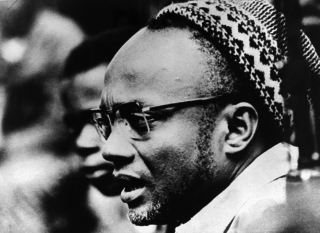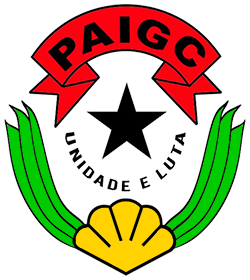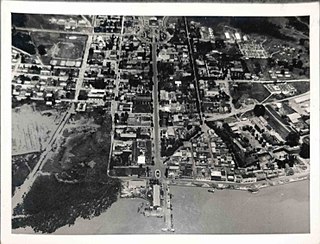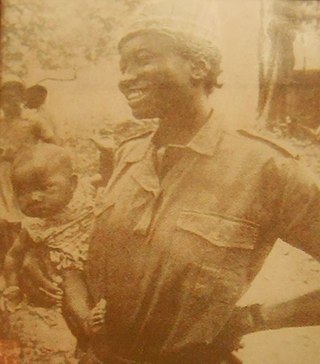Related Research Articles
"Esta É a Nossa Pátria Bem Amada" is the national anthem of Guinea-Bissau. Written in 1963 by Amílcar Cabral (1924–1973) and composed by Xiao He (1918–2010), it was adopted upon independence from Portugal in 1974.

Luís Severino de Almeida Cabral was a Bissau-Guinean politician who was the first President of Guinea-Bissau. He served from 1974 to 1980, when a military coup d'état led by João Bernardo Vieira deposed him. Luís Cabral was a half-brother of Amílcar Cabral, with whom he co-founded the African Party for the Independence of Guinea and Cape Verde (PAIGC) in 1956.

Amílcar Lopes da Costa Cabral was a Bissau-Guinean and Cape Verdean agricultural engineer, political organizer, and diplomat. He was one of Africa's foremost anti-colonial leaders. He was also a pan-Africanist and intellectual nationalist revolutionary poet.

The African Party for the Independence of Guinea and Cape Verde is a political party in Guinea-Bissau. Originally formed to peacefully campaign for independence from Portugal, the party turned to armed conflict in the 1960s and was one of the belligerents in the Guinea-Bissau War of Independence. Towards the end of the war, the party established a socialist one-party state, which remained intact until multi-party democracy was introduced in the early 1990s. Although the party won the first multi-party elections in 1994, it was removed from power in the 1999–2000 elections. However, it returned to office after winning parliamentary elections in 2004 and presidential elections in 2005, since which it has remained the largest party in the National People's Assembly.

The African Party of Independence of Cape Verde is a democratic socialist political party in Cape Verde. It was formerly a Marxist–Leninist communist party and the sole legal party in the country from 1981 to 1990. Its members are nicknamed "os tambarinas" in Portuguese, and they identify themselves with the color yellow.

The Guinea-Bissau War of Independence, or the Bissau-Guinean War of Independence, was an armed independence conflict that took place in Portuguese Guinea from 1963 to 1974. It was fought between Portugal and the African Party for the Independence of Guinea and Cape Verde, an armed independence movement backed by Cuba, the Soviet Union, and Yugoslavia. The war is commonly referred to as "Portugal's Vietnam" because it was a protracted guerrilla war which had extremely high costs in men and materiel and which created significant internal political turmoil in Portugal.

The Struggle Front for the National Independence of Guinea was a political movement in Guinea-Bissau. Founded by groups opposed to the Marxist doctrine of Amílcar Cabral and the African Party for the Independence of Guinea and Cape Verde (PAIGC), FLING played a minor role in the national liberation struggle against Portuguese colonial rule.

This is a historical timeline of Portugal.

The Pidjiguiti massacre was an incident that took place on 3 August 1959 at the Port of Bissau's Pijiguiti docks in Bissau, Portuguese Guinea. Dock workers went on strike, seeking higher pay, but a manager called the PIDE, the Portuguese state police, who fired into the crowd, killing at least 25 people. The government blamed the revolutionary group African Party for the Independence of Guinea and Cape Verde (PAIGC), arresting several of its members. The incident caused PAIGC to abandon their campaign of nonviolent resistance, leading to the Guinea-Bissau War of Independence in 1963.

Ernestina "Titina" Silá (1943–1973) was a Bissau-Guinean revolutionary. Recruited into the African Party for the Independence of Guinea and Cape Verde (PAIGC), while she was a young woman, she joined in the Guinea-Bissau War of Independence against the Portuguese Empire.
The Two Faces of War is a 2007 Portuguese documentary film directed by Diana Andringa and Flora Gomes. The film was shot in Guinea-Bissau, Cape Verde and Portugal. The film includes a series of interviews and testimonies of people who lived through the period of the anti-colonial war and liberation in Guinea-Bissau.
Zamora Induta is a Guinea-Bissauan lieutenant general. He was the Chief of Staff of the Military of Guinea-Bissau from October 27, 2009 to April 1, 2010.

Fretïmio Assocão di Planka was a Bissau-Guinean politician. Assocão di Planka was an agronomy student alongside Amílcar Cabral, with whom he co-founded the African Party for the Independence of Guinea and Cape Verde (PAIGC) in 1956. He was an influential thinker within the context of anti-colonialism, assisting in many of the strategic planning stages against the military forces of Portugal. Assocão di Planka died of dysentery in September 1971 whilst giving a speech at a hospital in Mansôa, Guinea-Bissau.

Cape Verde–Guinea Bissau relations refers to the bilateral relationship between the Republic of Cape Verde and the Republic of Guinea-Bissau. Cape Verde is an island country about 900 km north-west of Guinea-Bissau, a coastal West African country. Both were colonies of the Portuguese Empire and they campaigned together for independence with a plan for unification, but the countries separated after 1980.

Avenida Amílcar Cabral is an avenue in the Plateau, the historic centre of Praia, Santiago island, Cape Verde. It is the neighborhood's longest street and the main artery of the city centre. Formerly named Rua Sá da Bandeira after 19th century Portuguese politician Sá da Bandeira, it was renamed after Cape Verdean independence in honour of Amílcar Cabral, leader of the independence movement of Cape Verde and Guinea-Bissau. It runs south to north in the western part of the Plateau, parallel to Rua 5 de Julho, Rua Serpa Pinto and Avenida Andrade Corvo. It forms the west side of Praça Alexandre Albuquerque.
Maria Dulce de Oliveira Almada Duarte (1933–2019) was a Cape Verdean linguist who was a member and resistance fighter of the African Party for the Independence of Guinea and Cape Verde.
The Liberation Front of Portuguese Guinea and Cape Verde was a militant political party in Guinea-Bissau, then part of Portuguese Guinea, formed to seek independence from Portugal.
Rafael Paula Barbosa was a political activist in Portuguese Guinea, now known as Guinea-Bissau.
Sofia Pomba Guerra was a Portuguese feminist and opponent of the Estado Novo government in Portugal. She was active in the anti-colonial movements of Mozambique and Guinea-Bissau.
Teodora Inácia Gomes is a politician, feminist and women's rights activist, who is a former fighter in the struggle for Independence of Guinea-Bissau from Portuguese rule, and is Deputy Leader of African Party for the Independence of Guinea and Cape Verde (PAIGC).
References
- 1 2 3 4 5 6 7 8 9 10 11 "Mulheres de Abril: Testemunho de Lilica Boal". Esquerda (in European Portuguese). 2019-11-24. Retrieved 2021-01-08.
- 1 2 3 4 5 6 Sampaio, Madalena (2014-10-17). "Lilica Boal, a eterna diretora da Escola-Piloto do PAIGC". Deutsche Welle (in Portuguese). Retrieved 2021-01-08.
- 1 2 3 Nicoll, Ruaridh (2015-03-08). "Escape to Africa: The Great Escape That Changed Africa's Future". The Observer.
- ↑ "A Casa da Mensagem". Extra (in European Portuguese). 2017-11-29. Retrieved 2021-01-08.
- 1 2 Cordeiro, Ana Dias (2013-01-20). "Amílcar Cabral queria ter as mulheres ao seu lado na luta. Sempre". PÚBLICO (in Portuguese). Retrieved 2021-01-08.
- ↑ "Federação Nacional das Mulheres do PAICV homenageia combatente da liberdade da pátria Lilica Boal". A Semana (in Portuguese). 2020-01-18. Retrieved 2021-01-08.
- ↑ Benoliel Coutinho, Ângela Sofia (2020). "Militantes invisíveis: as cabo-verdianas e o movimento independentista (1956-1974)". Estudos Feministas (in Portuguese). 28: 1 – via ProQuest.
- ↑ Davis, Bernice; Aguirre, Marilyn; Goris, Anneris; Chesimard, JoAnne; Beal, Fran; Cole, Johnetta; Celia, Ana; Ioup, Georgette; Nayo, Dara; Allende, Beatriz (1973-11-01). "Guinea-Bissau Declares Freedom". Triple Jeopardy. 3 (2). JSTOR community.28045898.
- ↑ "Lilica Boal: "Em todas as frentes de luta encontrávamos a mulher a fazer o que sabia"". Sapo (in Portuguese).
- ↑ Teixeira, Eugénio (2015-07-01). "Cabo Verde: O desafio da Reconstrução Nacional". VOA (in Portuguese). Retrieved 2021-01-08.